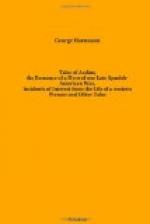“Surely, amigo,” said Reyes, “you will not blame me now for not entering, but you have endurance, for Dios! I should not have survived so long. Thank God you came out alive! When I saw them pass in knives, I had my doubts and momentarily expected to hear the report of your revolver. But when I saw you pass by infatuated with Jtz-Li-Cama, the cacique’s daughter and wife of the murderous scoundrel, El Macho, then I gave you up. Oh, see what is happening now. Amigo, you have broken up the dance. So it seemed. The drum was silent now and we heard the voices of men arguing in the Aztec idiom. Of a sudden the lights were extinguished and the crowd came out with a rush, and silently they stole away in the darkness.
“Now, amigo,” said Reyes, “let me tell you something, which may haply serve you well. Knowing that an American accomplishes things which a Mexican like myself must let alone, I advise you to try for the hidden treasure of La Gran Quivira. Seeing that you are in the good graces of Jtz-Li-Cama, you might prevail with the cacique to guide you. He is said to be the only living man who knows the secret of the trove in the ruins of the sacred temple of the ancient city. The Indians believe that this treasure, which the Aztecs hid from the Spaniards, is guarded by a terrible phantom dog, the specter of one of the great dogs of Fernando Cortez which ravened among their Aztec ancestors. They fear the specter of this fabled Perro de la Malinche more than anything else on earth, as it is said to harrow their souls in Hades as it ravened their bodies when in the flesh.”
After smoking a few cigarritos, my friend proposed to ride home, as there was really nothing else to be done. We rode slowly along, enjoying the beautiful night of this faultless climate, and I shall ever remember this night to my last day. There was a pleasant, refreshing odor in the air, the scent of the wild thyme which grows in these sand dunes. The moon rose over the Manzana range and flooded the broad valley with its soft, silvery rays. Suddenly, at a sharp turn of the trail, we found ourselves surrounded by silent forms arisen from the misty ground. “Don Reyes Alvarado,” spoke the voice of the Indian, known as the macho, “I have come for revenge and am now ready to wipe out the insults you heaped on me when you charged me with the theft of your calves. I challenge thee to fight. Alight from thy horse, cowardly Spaniard! To-night of all nights shalt thou feel the Indians’ blade between thy ribs.” “Fight him, amigo,” I said. “I shall enforce fair play.” But my friend Reyes whom I knew to be a man of both strength and courage, weakened, being cowed with the superstition of the unlucky Noche Triste. “Tomorrow I shall fight thee, Indian,” he answered “not at nighttime, like a thieving coyote.” “If thou wert not astride thy horse and out of my reach, thou wouldst not dare say that to me, thou cuckold dupe of the Americans!” sneered the Indian. This insult to my companion angered me, and I demanded a retraction and an apology therefor from the Indian. When the macho flatly refused and repeated the insult in a more aggravating manner, I replied that I feared not to meet him or any other goatherding Indian and was ready to fight him on the spot.




